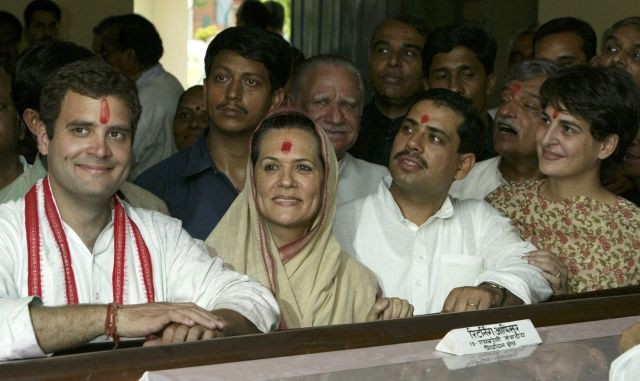India’s National Son-In-Law Versus ‘Mango People Of A Banana Republic'

Robert Vadra, the businessman son-in-law of India’s Congress-led ruling United Progressive Alliance (UPA) Chairman Sonia Gandhi, deserves some credit for the clever wordplay that he has offered to define a nation and its people.
Vadra Monday updated his Facebook status to read “Mango people in a banana republic,” a statement reeking of disdain and referring to Indian anti-corruption activist Arvind Kejriwal and the people on whose behalf he claims to be fighting. As a Times of India headline reads, the “mango people” did go bananas over the observation, and Vadra, realizing that his sarcasm didn't go down their throats well, swiftly deleted his Facebook account.
One wonders why the man, married into the family that always provides the “natural” heirs for India’s prime ministerial throne from time to time and whose mother-in-law “rules” the country, failed to realize the irony of calling India a banana republic.
Though the term banana republic has been in the public realm for a very long time, “mango people” is strictly Indian and a literal translation of the Hindi phrase “aam aadmi” meaning “the common man.”
But lucky for “aam aadmi,” “aam” in Hindi also means mango and “aadmi” could be stretched to mean “people,” and what you get at the end of this language exercise is Vadra’s “mango people.”
Vadra’s eloquence on Facebook and the allegations by Kejriwal and fellow activist Prashant Bhushan that Vadra amassed properties worth over Rs. 300 crore ($57 million) through corrupt land deals have sparked incensed debates across Indian media.
The civil society activists have alleged that realty giant DLF sold Vadra prime land properties in Delhi and nearby areas at throwaway prices and also offered him interest-free loans as advances. Vadra’s wealth grew from Rs. 50 lakh ($95,000) to more than Rs. 300 crore in three years, according to the activists.
Vadra said that that his business transactions were “fully reflected in financial statements filed before appropriate government authorities in compliance with the law.”
The accusations unleashed a whirlwind of counter-allegations against Kejriwal and Bhushan, with Congress leaders one-upping each other to defend Vadra, who has over the years earned himself the title of the “national son-in-law” in the Indian media.
“An inquiry into what?” Congress spokesperson Manish Tewari retorted to opposition BJP’s spokesperson Ravishankar Prasad’s demand for an investigation into the real estate dealings. “Is a business transaction between two private entities duly reported to the statutory authorities illegal?" Tewari said.
"Vadra is a businessman, he's not doing kheti (farming). All businessmen take loans to build their business. What is wrong with that?" said Rajiv Shukla, Union Minister of State for Parliamentary Affairs.
Even non-Congress leaders like RJD chief Lalu Prasad Yadav came up with comments condemning Kejriwal that made almost no sense and sounded only like a desperate attempt to please Sonia Gandhi.
“Kejriwal is raising issue of Vadra's wealth to get cheap publicity. What does Kejriwal have to do if anyone gave their property to another for free?" Yadav said. Of course, the RJD chief who has had his fair share of corruption scandals in the past can’t understand what is wrong with two entities transacting properties out of pure love (which the media now call the “sweetheart deal”).
Notably, the public discourse surrounding the real estate controversy has branched out to issues regarding the media coverage of the esteemed Gandhi family (which, by the way, doesn’t have anything to do with M.K. Gandhi) and the allegations of wrongdoings against them.
Interestingly, though the details of Vadra’s DLF dealings have been in the public domain for more than a year, the current controversy smells one hundred percent fresh. Why?
“It’s only the print media though, that was doing all the talking (about Vadra’s DLF deals). TV news channels stuck to their Sharia which prohibits them from ‘blasphemy’ against the Sonia Gandhi clan,” Media Crooks, a blog dedicated to issues related to Indian media, notes.
According to Media Crooks, the Economic Times (ET) was among the first to do a full story, in March last year, of Vadra’s partnership with DLF. It was followed by Outlook magazine which did an analysis of the ET article with reactions from opposition parties including the BJP.
Still, only when Kejriwal and Bhushan publicly accused Vadra of wrongdoings, did the issue gain the kind of attention it has long deserved.
Now that the story has gained more than enough attention, thanks to “mango people,” Indian media is celebrating the fall of the famous son-in-law who some Congress leaders like to call “a private citizen.”
“Saving Private Vadra: The Congress needs a new script” says a headline of a story published by First Post.
The Indian media is not leaving Priyanka Gandhi, Sonia Gandhi’s daughter and the wife of Vadra, out of the picture.
However, her presence is merely for a tease directed at Vadra: “Each time Robert Vadra steps into the spotlight, the average mango folks can’t help but wonder, “Really? She married him?”” First Post columnist Lakshmi Chaudhry writes: “Of all the men at all the Delhi A-list parties, Priyanka Gandhi picked this guy?”
Like what they say about misfortune, Indian media also attack in packs.
© Copyright IBTimes 2024. All rights reserved.












